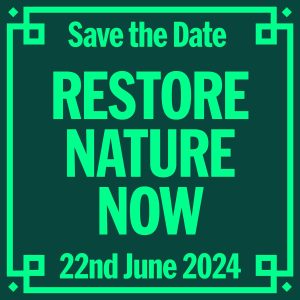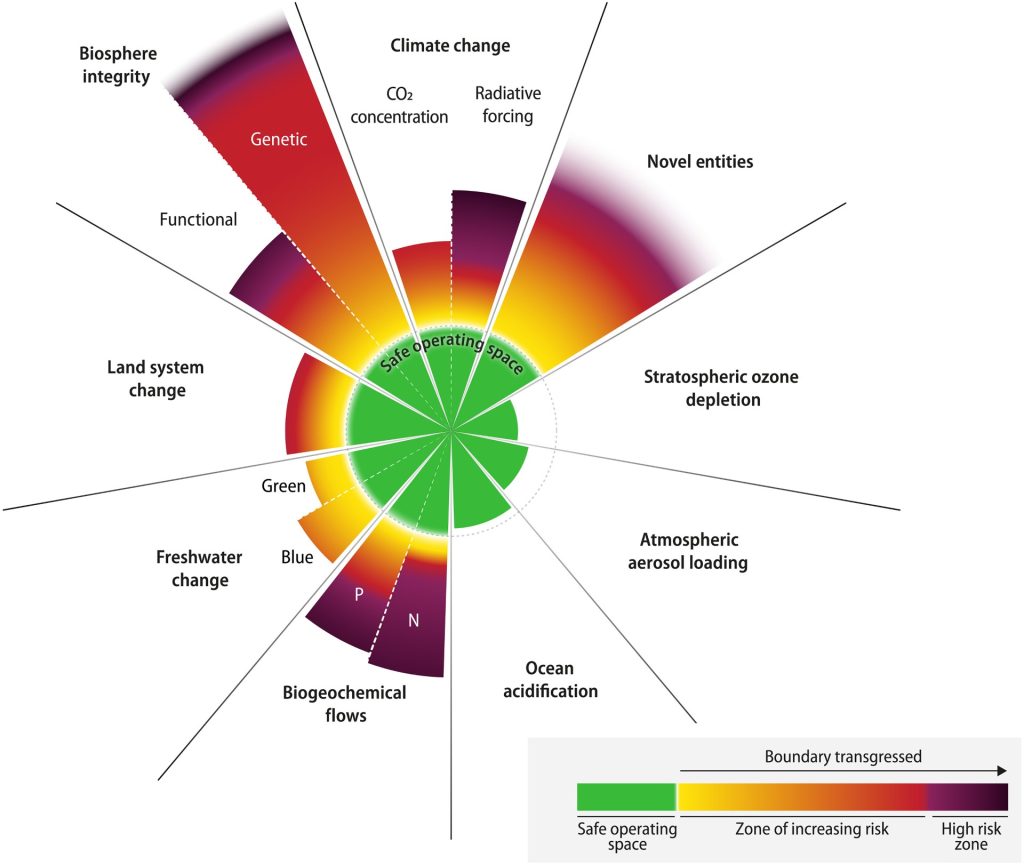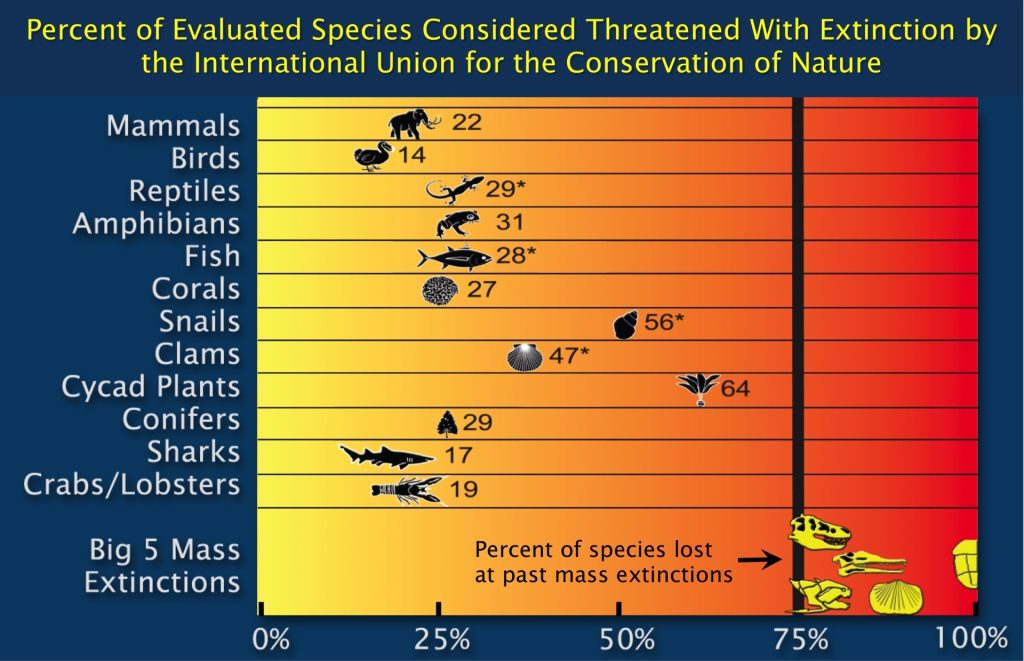Restore Nature Now – or else!
“Let us not, however, flatter ourselves overmuch on account of our human victories over nature. For each such victory nature takes its revenge on us. Each victory, it is true, in the first place brings about the results we expected, but in the second and third places it has quite different, unforeseen effects which only too often cancel the first.” [1]
 Allan Todd writes: The sober warning above – issued by Engels in 1876 (in Dialectics of Nature, p. 182) – was echoed, over 130 years later, by John Bellamy Foster in 2010: “It is now universally recognized within science that humanity is confronting the prospect – if we do not soon change course – of a planetary ecological collapse.” As recent reports have shown, both of those warnings have been largely ignored – in particular, by the capitalist corporations which, via their constant profit-seeking determination to inflict yet more ‘victories’ over nature, continue to drive humans, and the planet, to just such an ecological collapse. [2]
Allan Todd writes: The sober warning above – issued by Engels in 1876 (in Dialectics of Nature, p. 182) – was echoed, over 130 years later, by John Bellamy Foster in 2010: “It is now universally recognized within science that humanity is confronting the prospect – if we do not soon change course – of a planetary ecological collapse.” As recent reports have shown, both of those warnings have been largely ignored – in particular, by the capitalist corporations which, via their constant profit-seeking determination to inflict yet more ‘victories’ over nature, continue to drive humans, and the planet, to just such an ecological collapse. [2]
Planetary boundaries
Environmental groups rightly pay considerable attention to the climate crisis, the increasing impacts of ‘global boiling’, and thus the need to prevent all new fossil fuel developments. However, the 2024 Global Tipping Points Report focussed on much more than the climate crisis, and gave stark warnings about the risks of transgressing nine key planetary boundaries or limits. Going beyond those safe limits risks the environment not being able to self-regulate anymore – thus undermining the stability of the Holocene: the period in which human society developed. As early as 2009, Johan Rockström and other scientists had noted that the safe limit for biodiversity loss had already been crossed, to the extent that there were clear signs of a ‘change in biosphere integrity’. In 2023, the sixth planetary boundary – freshwater resources – was crossed. [3]
 A similar warning came from eminent biologist Edward Wilson, who commented in 2016 that: “For the first time in history a conviction has developed among those who can actually think more than a decade ahead that we are playing a global endgame.” Another warning was provided by Kate Raworth in 2017, when she called for a shift from the obsession with constant and constantly-increasing economic ‘growth: “On a planet with intricately structured ecosystems and a delicately balanced climate,… how big can the global economy’s throughflow of matter and energy be in relation to the biosphere before it disrupts the very planetary life-support systems on which our well-being depends?” [4]
A similar warning came from eminent biologist Edward Wilson, who commented in 2016 that: “For the first time in history a conviction has developed among those who can actually think more than a decade ahead that we are playing a global endgame.” Another warning was provided by Kate Raworth in 2017, when she called for a shift from the obsession with constant and constantly-increasing economic ‘growth: “On a planet with intricately structured ecosystems and a delicately balanced climate,… how big can the global economy’s throughflow of matter and energy be in relation to the biosphere before it disrupts the very planetary life-support systems on which our well-being depends?” [4]
Because these problems are global and progressive, because the prospect of a point of no return is fast approaching, the problems can’t be solved piecemeal. A systemic solution is needed.
Ecosystems
As noted by British ecologist Arthur Tansley as early as 1913, to study any animal or plant properly, it was crucial to do so in relation to their wider biome, or habitat, in the widest sense. He pointed out how ecosystems are parts of larger ones, that overlap, interlock and interact with each other, with a reciprocal relation between organisms and the larger material environment. In particular, he noted how “the destructive human activities of the modern world” disrupted such systems, and could even undermine entire ecosystems – thus leading to the extinction of entire species. He accepted that, with early moves from hunting and gathering to agriculture, human societies increasingly destroyed and cleared local natural habitats to ‘create’ land for crops, animals and houses. The problems created by this were at first relatively small-scale and local. However, as Tansley noted in 1939: “…this destructive activity has spread during recent centuries, and at an increasing rate, all over the face of the globe except where human life has not yet succeeded in supporting itself.” [5]
Rates of extinction
To get some indication of how much of the natural world and its species is being lost year on year, it’s useful to bear in mind that the normal pre-human extinction rate of species was approximately one species per million species a year. However, in 2015, a study confirmed that today’s rate of extinction is now as much as one thousand times higher than the ‘normal’ rate of extinction. The conclusion of that study was that the Sixth Mass Extinction was definitely taking place.
And, because of habitat loss in particular, the rate of extinction is rising in most parts of planet Earth. As well as the extinction of known species, there is also the question of how many currently-unknown species are also being destroyed – presumably at the same rate of extinction. In 1997, the UN’s Environment Programme raised the fear that it was possible that, if ‘business as usual’ continued, the extinction rate could soon rise to 10,000 times the natural rate.
Then, in 2019, in the most comprehensive assessment of its kind, the Intergovernmental Science-Policy Platform on Biodiversity and Ecosystem Services (IPBES) warned about the dangerous decline of Nature, at “rates unprecedented in human history” and that the rate of species extinction was “accelerating.” Then it warned that 1 million species were threatened with extinction – which would have “grave impacts on people around the world.” Then, in 2023, the journal ‘Plos One’ reported results of a study which showed that, globally, 2 million plant and animal species are currently threatened with extinction. The conclusion was that safeguarding existing natural habitats was not enough – instead: “restoring sustainable land and water use practices is crucial to minimise future biodiversity declines.” [6]
Five human activities have been identified as being most ruinous to the natural world and all those Earthlings which live in, and depend, on it – including humans. Out of those five activities, habitat destruction – partly by climate change, but mostly by farming – is considered to be the worst. Clearly, then, there needs to be a significant global shift away from intensive modern agriculture – in particular, from mass meat and dairy production and consumption, to largely plant-based diets. Also significant is pollution of freshwater supplies – the effluent run-off from intensive animal agriculture is actually a bigger cause of pollution that the sewage currently being dumped in our rivers, lakes and seas by the private water companies.
Pandemics
One reason for making such a change is not only to slow habitat destruction and the accelerating extinction of species – but also for our own protection from ‘new’ diseases crossing from wild animals to us. In some ways, the Covid-19 pandemic grew out of the wider climate crisis. For instance, in April 2024, it was reported that, because of global boiling, dengue fever and malaria infections are now significant risks in Europe. As of 2023, the Asian tiger mosquito – which carries dengue fever -became established in 13 European countries: Italy, France, Spain, Malta, Monaco, San Marino, Gibraltar, Liechtenstein, Switzerland, Germany, Austria, Greece and Portugal. As Engels observed – when commenting on how, unlike other animals, humans attempt to master, as opposed to merely using, their environments – there can often be unintended and unexpected consequences. [7]
But Covid-19 was much more to do with the huge destruction of the natural world and the resulting ecological crisis. In a way, the devastating Covid-19 pandemic, which continues to kill people across the world, can be seen as Nature’s equivalent of Clint Eastwood’s character ‘Walt Kowalski’, in the film Gran Torino (2008), taking its revenge on humans for the massive damage being done to its ecosystems. As Walt says in the film: “Ever notice how you come across somebody once in a while that you shouldn’t have f**ked with? That’s me.” [8]
Rightwing conspiracy theories notwithstanding, the Covid-19 pandemic was caused by a pathogen crossing over from the natural world to humans – initially beginning at the Hua’nan Seafood Wholesale Market in Wuhan: the largest wholesale seafood market in Central China. Most significantly for the origins of Covid, that market reportedly also sold seventy-five species of wild animals – “more than 90 percent of the samples that turned up positive for the virus were found in the section of the…seafood market that trafficked in exotic animals sold for food.” [9]
In fact, Covid-19 is the fourth such zoonotic pandemic/epidemic to hit humans this century.
In 2002, and again in 2004, there was SARS, which killed about one in ten of those catching this particular respiratory disease. Then, in 2012 there was MERS – which went on to kill one in three. Then, from 2013-16, there was Ebola – though this was a filovirus, whereas the other two were coronaviruses. Most of these appear to have originated in bats – in the case of MERS, it spread to camels, and from them to humans.
At the end of 2019, a scientific paper concluded that: ‘The SARS epidemic demonstrated that novel highly pathogenic viruses crossing the animal-human barrier remain a major threat to global health security.’ More recently, Mark Woolhouse Professor of Infectious Disease Epidemiology at Edinburgh University, has predicted that another pandemic like Covid could be “around the corner” and that “it is a matter of when, not if” that happens. [10]
Half-Earth
As early as 2002, Edward Wilson had suggested leaving and/or returning half of the world to nature. He saw that suggestion as “a first, emergency solution commensurate with the magnitude of the problem: I am convinced that only by setting aside half the planet in reserve, or more, can we save the living part of the environment and achieve the stabilization required for our own survival.” [11]
While, in the past, relatively small local areas have experienced extinctions of several species as a result of aspects of some of the economic systems adopted by humans, today we are facing planetary-level extinctions because of one particular type of economic system: capitalism. As capitalism has extended its reach beyond local areas to regions and continents, and then to the entire globe, it has increasingly “pushed environmental degradation to the planetary level, as habitat destruction decimates the living conditions of species and as ecosystems are radically transformed.” [12]
Consequently, it’s becoming abundantly clear that a real, fundamental ‘System Change’ is desperately needed if we are to ensure that humans and all other Earthlings survive. That ‘Great Transformation’ will, ultimately, have to be away from capitalism. Even just a few decades ago, the term ‘anti-capitalist’ was almost exclusively heard amongst members and supporters of revolutionary organisations. But, now across the globe, it is a position that has been taken up by millions since the last decade of the 20th century.
It’s important to remember that capitalism has only existed for around 250 years at most – a small part of total human existence. It is clearly not the best that humans can come up with – so let’s strive to come up with a better, more sustainable world and economic system. As Marx would probably have said if he were still alive: “People of the world unite! You have a planet to save!”
This why ecosocialists should make a real effort to build and attend that 22 June demo – which is backed by Extinction Rebellion and Just Stop Oil, and organisations such as Greenpeace, Friends of the Earth, along with various wildlife/nature groups. You can find out more about the demo – and how to get involved – via these links: https://www.restorenaturenow.com/ https://www.restorenaturenow.com/supporters
https://extinctionrebellion.uk/restore-nature-now
Also supporting this demo is Chris Packham’s Love and Rage, which has “a vision of a world where we don’t just survive, we thrive. A world where our climate is stable, biodiversity is flourishing, animal suffering and wildlife persecution have ended and humans are healthy and happy.” This will be a great opportunity to make the case that the ‘Great Transformation’ we need to see is away from capitalism to ecosocialism – or something very like it. To do that, we need to do more than just stop the on-going destruction and pollution of the natural world: we need to do consider Pachamama and do as the slogan of this forthcoming demo says: “RESTORE NATURE NOW!” [13]
————————————————————————
Endnotes
[1] Engels, F., 2012, Dialectics of Nature, London, Wellred Books, p.182
[2] Foster, J. B., 2010, The Ecological Rift: Capitalism’s War on the Earth, New York, Monthly Review Press, p.423
[3]https://ui.adsabs.harvard.edu/abs/2009Natur.461..472R/abstract
[4] Wilson, E. O., 2016, Half-Earth: Our Planet’s Fight for Life, New Yor, Liveright, p.1; Raworth, K., 2017, Doughnut Economics: Seven Ways to Think Like a 21st.Century Economist, London, Random House, p.76
[5] Foster, J. B., 2010, op cit., pp.329-30
https://journals.plos.org/plosone/article?id=10.1371/journal.pone.0293083
[8] https://www.quotes.net/movies/gran_torino_124191
[9] Greger, M, 2020, How to Survive a Pandemic, London, Bluebird Book, p.xvi
[10] Greger, M., 2020, op. cit., pp.xi-xii, xv; https://www.standard.co.uk/news/world/what-is-disease-x-vaccine-pandemic-wef-davos-b1099041.html
[11] Wilson, E. O., 2016, op. cit., pp.54-5
[12] Foster, J. B., 2010, op cit., p.271
==========================================
Allan Todd is a member of Left Unity’s National Council and ACR’s Council, and of Transform; and is an ecosocialist/ environmental and anti-fascist activist. He is the author of Revolutions 1789-1917 and Trotsky: The Passionate Revolutionary – and the forthcoming Che Guevara: The Romantic Revolutionary (out 30 May 2024)
Left Unity is active in movements and campaigns across the left, working to create an alternative to the main political parties.
About Left Unity
Read our manifesto
Left Unity is a member of the European Left Party. 
Read the European Left Manifesto
ACTIVIST CALENDAR
Events and protests from around the movement, and local Left Unity meetings.

Saturday 10th January: No to Trump’s war on Venezuela
Protest outside Downing Street from 1 to 3pm.
More events »
GET UPDATES
Sign up to the Left Unity email newsletter.
CAMPAIGNING MATERIALS
Get the latest Left Unity resources.





